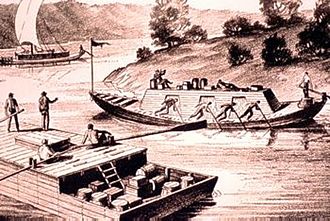Ironton Register 30 January 1896
For the two decades of this century, and during most of the third, all of the commerce of the Ohio and Mississippi and their tributaries was carried on by a few keel and flat boats. I believe that Luke and James Miller, and perhaps others of the same family, followed the same business and that Luke finally drowned while boating. Those were heroic days, and boating was well-calculated to develop a hardy and rugged type of man.
It was a life full of adventures, excitement, and perils. Inured to constant hardships, and isolated from all society for months at a time, and often for a longer period, illiterate in the start, they acquired a rough and rude language peculiar to boatmen of that period.
There were no newspapers in those days, and no way of getting information as to what could be gleaned from “newcomers,” travelers passing through, and from boatmen. This gave rise to a custom that prevailed quite generally, of plying such people with questions in view of attaining all the information possible in a given time.
The settlers along the river were few and far between and always glad to see a fellow being and to engage him in a short conversation even at long range. So when a man saw a boat coming he would go to the bank and hail her. A fusillade of questions would be fired back and forth as long as the boat was within speaking distance.
Those interviews often ended in an altercation of words with taunts, threats, and such epithets as the such party thought proper to indulge in. In some instances, a resort to the rifle was deemed necessary to maintain the honor and dignity of the injured party. These extreme cases were inspired by a few bad characters found among boatmen at that time, who were abusive and insulting when an occasion was presented in which they dared to be so.
On one occasion a raft was passing a landing in Lawrence county and seeing a woman washing at the river’s edge and no man in sight, the captain called to her and began to use improper language. The woman ran up to the bank and told her grievance to her husband who snatched his gun and followed.
As soon as he had gained speaking distance he demanded a retraction and an apology for the insult. His demand was treated with contempt and he was called a coward. In an instant, a bullet struck uncomfortably near the captain and right among a crowd of men. The man reloaded and when about ready to fire again, the crew got under cover, but the captain stood his ground when another bullet whistled past him closer than the first.
The next time the man, who was a good marksman, designed to cut the leg of the captain’s pants, but the distance was increasing and his nerves unsteady from exertion; so aiming pretty close as he knew this to be his last shot being intercepted by a creek, a flesh wound in the captain’s leg was the result. The woodsman returned in triumph feeling that his own honor and his wife’s character had been fully vindicated.
A keelboat was one hailed by a man not a hundred miles from Symmes creek who asked the usual routine questions, which were answered by the captain as follows:
“Where do you hail from?” “Red Stone.”
“What you loaded with? Grindstones.”
“Where you bound for? Blue Stone.”
“Go to h___ &c. &c.,” was the abrupt ending of this laconic tilt.

Photo Courtesy of Wikipedia
I will not describe in detail how a keelboat was built. It resembled a canal boat, but not so wide, sharper at the bow and stern, with a keel the whole length, and rudder for steering, and capatan on the bow for warping up rapids, decked over, cabin under the deck and a runway on each side for the polemen or pushers to walk on.
A part of the crew was provided with poles eighteen or twenty feet long who would take their positions on the runway on the shore side of the boat and at the bow far enough apart to give each other plenty of room, would set their poles firmly on the bottom, the upper end of the pole against the shoulder, and then walk back to the aft end of the runway with a strong and steady step, thus giving the boat a great impetus forward.
A line was also passed to the shore and manned by a part of the crew by placing it over their shoulder and pulling as they walked along the beach. This was called cordelling and was practiced where the shores were suitable.
They often had to change from one side of the river to the other to accommodate themselves to its shifting conditions. In this way all the upriver freight was carried until these crafts were superseded by steamboats; an event regretted by those old keelers as they saw their occupation passing away, but an event hailed with joy by the people as the greatest revolution ever known in navigation since history began, and more potent of all forces in the development of the greatest country on the face of the earth.

0 Comments